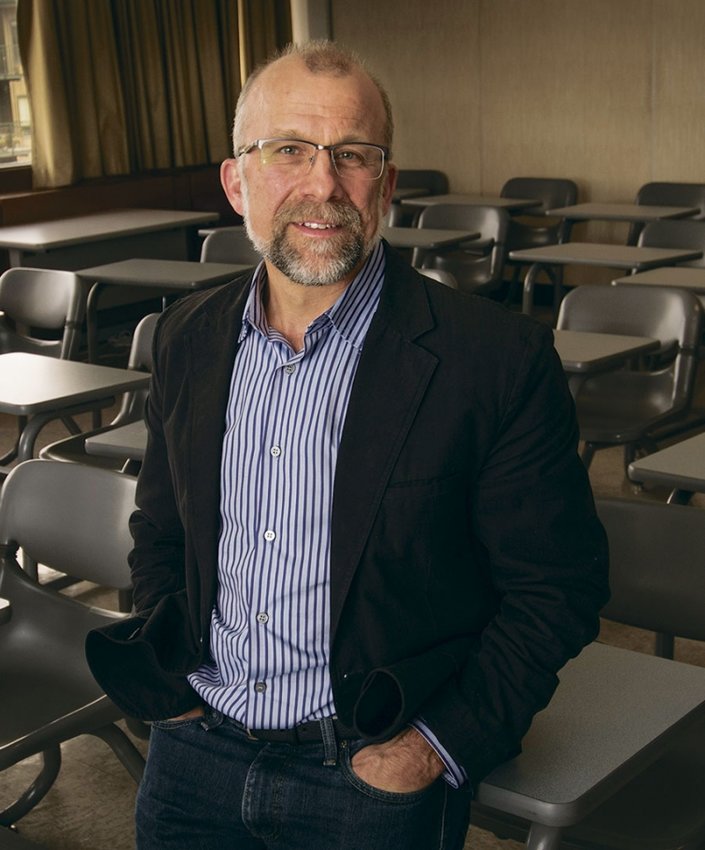 Jeb Wyman. Courtesy Seattle Central College
Jeb Wyman. Courtesy Seattle Central College
An engaged audience gathered at the Key Center Library in April to hear Jeb Wyman’s talk “Coming Home: How the Humanities Help Veterans Find Meaning After War,” sponsored by the Friends of the Library.
Wyman, who has taught English at Seattle Central College for two decades, read stories by many of his veteran students. He is the editor of “What They Signed Up For: True Stories by Ordinary Soldiers,” a book to be published later this year containing more than 70 first-person narratives from Vietnam to Afghanistan and Iraq. He is also the academic director of the Veterans Initiative of the Clemente Course in the Humanities in Seattle.
Wyman opened his talk with the illustrative stories of four veterans—what drew them to enlist, the empowerment they felt during basic training and the incredible challenges of both the war experience and returning home.
They enlisted for various reasons. For some it was idealism and service. For others, the military offered structure and a salary. All of them felt empowered during their basic training, gaining skills and discipline, creating a strong sense of community. And everyone, whether or not they ever fired a shot, suffered emotionally from their experience in war. Once back in the United States, they continued to be haunted by memories and, in addition, they no longer had the camaraderie that can so define a soldier’s life.
The Clemente Course was established in 1995 to bring critical reflective and creative skills to those who have been denied those educational opportunities. Its Veterans Initiative, now in its second year in Seattle, seeks to use the humanities to “save veterans’ lives,” Wyman said.
Participants are recruited by flyers and word-of-mouth at Veterans Affairs offices and community colleges. Ages range from the 20s to the 80s, they come from all branches of the service and include both men and women. The course is nearly six months long and meets for two and a half hours in the evening twice a week. Tuition and books are free, food is provided and there are subsidies for gas and child care.
“This isn’t a typical program,” Wyman said. “We do have assignments, but students are welcome if they have not done the reading. If they can’t make it to a class I simply ask that they text me to let me know they are OK.”
The course includes history, philosophy, art, literature and writing. Each section has nine classes and the focus in each section is on war or the impact of war. For instance, literature includes readings from Walt Whitman on the Civil War, Mark Twain on the Philippine-American War, Hemmingway, Wilfred Owen’s poetry from World War I, and more recent writings on the Vietnam War and current wars in the Middle East.
Philosophy readings from Aristotle, Kant, John Stuart Mill and the Bhagavad Gita spark discussions about right and wrong, consequence, balancing the greatest good for the greatest number, and duty—concepts that may be turned on their heads in the midst of a war.
Writing assignments ask students to reflect on such questions as “What do veterans sacrifice?” “What do veterans bring back?” and “What does society owe veterans?”
Wyman said that telling their stories helps veterans feel connected to their community and that they need listeners, even if it is not always easy to listen. He offered a quote from veteran and author Karl Marlantes: “To remain silent keeps you from coming home.”
Some members of the audience asked what might be done at a local level, saying there are a number of veterans who live in the KP community. Wyman described the Red Badge Project, where veterans get together with a teacher and write, and suggested that a local reading group could be established. He said it is also possible that a Clemente Course could be offered closer to our area.
The Friends of the Library program committee brings speakers and programs to the library every second Thursday of the month, covering a broad range of topics.
For more details about the Clemente Course, including the Veterans Initiative, go to http://www.clementecourse.org.
For more information about Wyman’s book, go to http://www.blueearbooks.com.
UNDERWRITTEN BY THE FUND FOR NONPROFIT NEWS (NEWSMATCH) AT THE MIAMI FOUNDATION, THE ANGEL GUILD, ADVERTISERS, DONORS AND PEOPLE WHO SUPPORT INDEPENDENT, NONPROFIT LOCAL NEWS